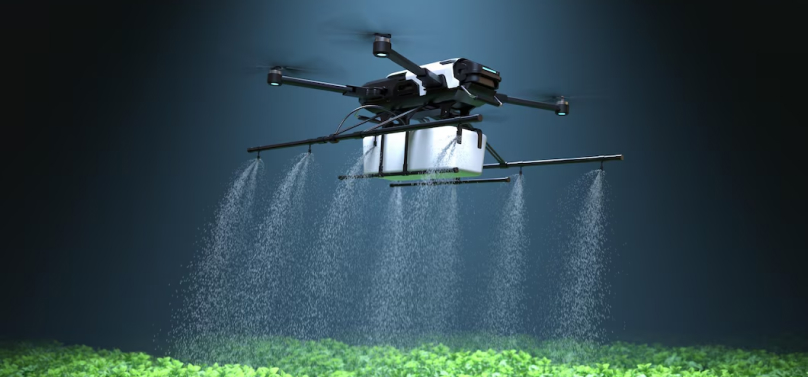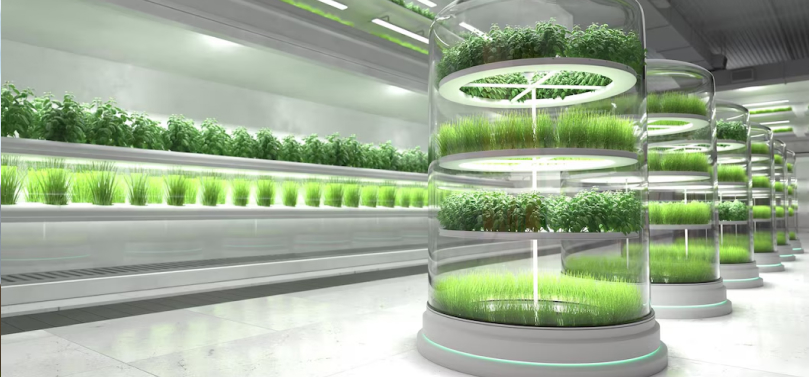Agriculture and Technology: Cultivating Innovation for Sustainable Growth
In the realm of agriculture, the marriage between traditional farming practices and cutting-edge technology is driving a transformative wave of innovation.
This synergy between agriculture and technology, often referred to as Agri Tech, holds immense potential to revolutionize food production, enhance sustainability, and address global challenges such as climate change and food security. Let's explore the fascinating intersection of agriculture and technology and its implications for the future of farming.

Precision Farming and IoT Integration:
One of the most significant advancements in Agri Tech is precision farming, which involves using sensors, drones, GPS technology, and data analytics to optimize various aspects of crop cultivation. IoT (Internet of Things) devices collect real-time data on soil moisture levels, weather conditions, crop health, and machinery performance, allowing farmers to make informed decisions and optimize resource utilization. This leads to increased productivity, reduced resource wastage, and improved crop yields.
Sustainable Practices and Smart Farming
Technology plays a vital role in promoting sustainable agriculture practices. Smart farming solutions, such as vertical farming, hydroponics, and aquaponics, enable year-round cultivation in controlled environments, minimizing water usage, reducing chemical inputs, and maximizing land productivity. Furthermore, the integration of renewable energy sources, such as solar-powered irrigation systems and smart grid solutions, contributes to reducing the carbon footprint of farming operations.
Data Analytics and Predictive Modelling
The abundance of data generated through Agri Tech solutions empowers farmers with valuable insights and predictive capabilities. Data analytics and machine learning algorithms analyse historical data patterns, weather forecasts, market trends, and pest/disease outbreaks to provide actionable recommendations. This helps farmers optimize planting schedules, manage crop diseases proactively, forecast yields accurately, and make informed marketing

Automation and Robotics in Agriculture
The advent of robotics and automation is revolutionizing labour-intensive tasks in agriculture. Robots equipped with AI-driven algorithms can perform activities such as planting, harvesting, weeding, and sorting with precision and efficiency. Automated machinery, such as autonomous tractors and drones for aerial spraying, streamline operations, reduce labour costs, and minimize human error, leading to increased operational efficiency and scalability.
Agri Biotechnology and Genetic Engineering
Biotechnology and genetic engineering have opened new frontiers in crop improvement and pest management. Genetically modified crops with traits such as drought resistance, pest tolerance, and increased nutritional value offer solutions to agricultural challenges. Bio pesticides and bio fertilizers derived from natural sources promote eco-friendly pest control and soil enrichment, aligning with sustainable farming practices and environmental conservation.
Challenges and Future Outlook
While Agri Tech presents immense opportunities, it also poses challenges that need to be addressed:
- Digital Divide: Ensuring equitable access to technology and digital literacy among farmers, especially in rural areas, is crucial for widespread adoption.
- Data Privacy and Security: Safeguarding sensitive agricultural data from cyber threats and ensuring data privacy remain paramount concerns.
- Regulatory Frameworks: Developing supportive policies, regulations, and incentives that foster innovation while ensuring environmental and social sustainability.
- Training and Capacity Building: Providing training and capacity-building programs to empower farmers with the knowledge and skills to leverage Agri Tech effectively.
Climate Resilience and Adaptation
Climate change poses significant challenges to agriculture, including unpredictable weather patterns, water scarcity, and increased pest pressures. Agri Tech solutions focused on climate resilience and adaptation are essential for mitigating these challenges. Examples include:
- Climate-smart Agriculture: Implementing practices such as conservation tillage, crop rotation, and agroforestry to improve soil health, water retention, and carbon sequestration.
- Weather Forecasting and Early Warning Systems: Leveraging weather data and satellite imagery to provide farmers with timely forecasts and alerts for extreme weather events, enabling proactive risk management.
- Drought and Flood Management: Utilizing precision irrigation systems, moisture sensors, and flood-resistant crop varieties to conserve water and mitigate the impact of droughts and floods on crops.
Collaboration and Partnerships
Collaboration between different stakeholders, including government agencies, research institutions, academia, private companies, and farmers' organizations, is essential for fostering innovation and sustainable development in agriculture. Initiatives such as public-private partnerships, knowledge sharing platforms, and joint research projects contribute to collective problem-solving and driving positive change in the agricultural sector.
This blog has highlighted why and how the career guidance process can help you or your child. Start right away and seek out the assistance you need by dropping a mail at support@margforyou.com






